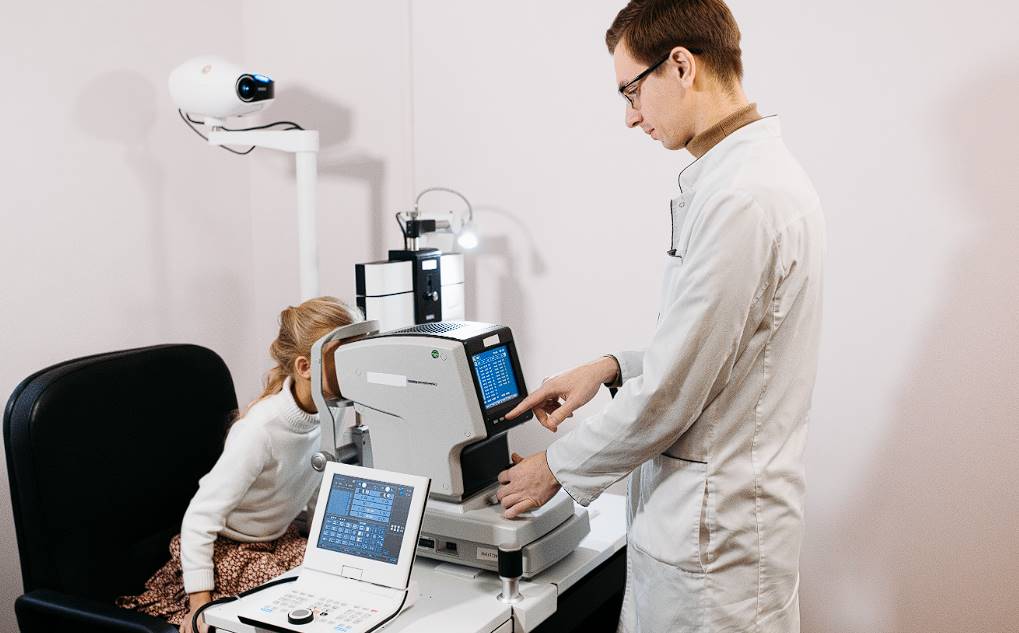Vision, as an essential sense, enables individuals to perceive and comprehend their surroundings. The majority of our understanding about the world is derived from visual information. Interestingly, the human brain dedicates more space to processing visual stimuli compared to any other sensory input, highlighting the significance of our eyes. Consequently, encountering issues with one's vision can be distressing.
Among the most prevalent problems related to eyesight is the inability to see clearly. Whether this issue arises suddenly or gradually, seeking professional advice is crucial as the initial step. Given that we heavily rely on our eyesight to perform daily tasks, experiencing blurry vision can be highly frustrating and may prompt individuals to seek assistance from trusted ophthalmologists or optometrists.
Blurry vision not only hampers a person's ability to navigate their daily life but can also serve as an indicator of underlying health concerns. Therefore, it is imperative to delve deeper into this topic, explore potential causes, and discuss effective strategies for managing and preventing it.
Blurry vision refers to a visual impairment characterized by reduced clarity, resulting in a fuzzy and out-of-focus perception of the surroundings. It can hinder the ability to see objects distinctly and can be indicative of various underlying conditions. This article explores the causes, symptoms, and associated conditions related to blurry vision.
What Are the Reasons of Blurred Vision?
Refractive Errors
Blurry vision often stems from refractive errors, such as nearsightedness (myopia), farsightedness (hyperopia), astigmatism, or presbyopia. These errors occur when the eye's shape or focusing ability is impaired, leading to a lack of sharpness in vision.
Age-related Factors
As individuals age, they may experience blurry vision due to presbyopia, a condition resulting from the natural aging process of the eyes. Presbyopia affects the eye's ability to focus on nearby objects, leading to blurred vision when performing tasks like reading or using digital devices.
Eye Diseases
Certain eye diseases can cause blurry vision, indicating a more serious underlying condition. Examples include:
a. Cataracts: The clouding of the eye's lens, which gradually impairs vision and causes a milky appearance.
b. Glaucoma: Increased pressure within the eye, leading to optic nerve damage and vision loss.
c. Macular degeneration: Deterioration of the macula, the central part of the retina responsible for sharp, detailed vision.
d. Diabetic retinopathy: A complication of diabetes that affects blood vessels in the retina, leading to vision problems.
Neurological Conditions
In some cases, neurological conditions can contribute to blurry vision. Conditions like multiple sclerosis (MS) or migraines can affect the optic nerve or brain regions responsible for vision, resulting in blurred or distorted visual perception.
Symptoms of Blurry Vision
Apart from the obvious reduction in visual clarity, blurry vision may be accompanied by the following symptoms:
- Double vision: Seeing two images instead of one.
- Pain or itchiness in the eyes.
- Headaches, particularly when focusing on objects or engaging in visually demanding tasks.
- Eye discharge, such as watery or pus-like discharge.
- Nausea, which may be experienced along with blurry vision in certain cases.
- Redness of the eyes, indicating potential inflammation or irritation.
Seeking Professional Advice
If you experience persistent or worsening blurry vision, it is crucial to consult a qualified healthcare professional, such as an ophthalmologist or optometrist. They can assess your symptoms, perform necessary examinations, and provide a proper diagnosis.
Blurry vision can significantly impact an individual's visual experience, making it challenging to perceive details clearly. While refractive errors and age-related changes are common causes, blurry vision can also indicate the presence of eye diseases or neurological conditions. Understanding the underlying causes and seeking professional guidance can help manage and address this visual impairment effectively.
Top Causes of Blurry Vision
Many things can cause blurry vision, from small physical problems to more serious ones that, if not treated, could lead to blindness. Let's look at structural problems, abnormalities, and eye diseases that blur your vision.
Refractive Errors
Astigmatism, nearsightedness, and farsightedness are all types of refractive errors. If your vision is still blurry, you should talk to a doctor and get an eye exam to find an approach that works for you.
Chemical Injuries
Chemicals can make it hard for you to see clearly. An eye injury from a chemical is caused by direct contact, like getting a liquid in the eye. But chemical fumes that get into the air can also burn your eyes. Be aware of potential hazards to your eyesight when using chemicals in your house or at work, and consider wearing safety glasses.
Eye Strain
When you look at a digital device for too long, your eyes can get tired or hurt. This is called "digital eye strain." Complying with the 20/20/20 rule to avoid the strain of using a computer and the blurred vision that can come from it.
Angle-Closure Glaucoma
Angle-closure glaucoma is a risky eye disease that must be taken care of immediately. Glaucoma is a group of eye diseases that worsen over time and hurt the optic nerve. One of the main signs of angle-closure glaucoma is blurry vision, which can come on quickly. Some other signs are:
- Blind spots in the middle of your view
- Blind spots in the edges of your vision
- Eye pain Tunnel vision
High Blood Sugar
If you can't see clearly, it could mean the body is having trouble controlling the sugar in your blood. If your blood sugar is too high for a long time, it can cause more serious eye and health problems. If you are worried about your glucose levels, make an appointment as soon as possible for a diabetic eye exam.
Detached Retina
Detachment of the retina is a serious problem that can make it hard to see. It happens when the retina, the delicate layer at the back of your eye that picks up light, gets hurt. This occurs when the retina doesn't get enough oxygen or when a hole forms in the retina and lets fluid gets stuck between the retina and the web of veins underneath.
When you have blurry vision, you might also see a grey, whirling curtain of floaters fall over your vision. You might also see flashing lights before you lose sight in this way.
Trauma or Injury to the Eye
Eye injuries like bruises, cuts, and scratches can cause blurry vision. They can be caused by accidents, contact with chemicals, or getting something in the eye.
If you hurt your eye, you should immediately see an eye doctor. Eye injuries may lead to serious damage to the eye and loss of sight.
Autoimmune Disorders
The coloured web that encompasses your pupil is your iris. It lets light pass through to the lens behind it. Iritis is a reaction (or illness) of the iris caused by the immune system. Iritis can cause vision problems and sensitivity to light, among other things.
Iritis can happen on its own, but it can also happen with rheumatoid arthritis, which is another autoimmune disease.
Migraines
Migraine attacks are a type of neurological disorder that causes very bad headaches. They often come with feeling sick, being sensitive to light, and having trouble seeing. Most migraines can be treated with medicine and changes in lifestyle, but it's best to see a doctor if you're having symptoms.
Eye Infections
If you're suffering from an eye infection, especially one caused by bacteria, you may notice that you can't see clearly. There are many kinds of eye infections, but conjunctivitis, or "pink eye," is one of the most common.
When you have pink eye or another infection, your eyes may feel like they have grit and are light-sensitive. If you do catch a bacterial eye infection, you can get better by using a topical treatment or taking antibiotics.
With an eye exam, your optometrist can tell if you have an infection and what steps to take to get clear vision.
Optic Nerve Inflammation
Inflammation of the optic nerve, also called optic neuritis, makes it hard to see clearly. Most cases of optic neuritis get better independently, but if you have a severe case, your doctor may give you steroids to speed up the process.
Cataracts
Cataracts make the eye's lens cloudy and can happen in one or both eyes. Cataracts happen independently, worsen over time, and usually affect people over 40.
Cataracts can cause blurry or foggy vision, especially if it fluctuates or only affects one eye. It is possible to lose your vision without pain or redness. There are also problems with driving at night, halos around illumination, and errors in how light bends.
When to See a Doctor
If you exhibit any of the following signs, it could mean you have a dedicated eye problem that could damage your eyes permanently and make it hard for you to see. You might need critical eye care or medical help if any of the following happen:
- You need to catch up on one area.
- Signs of a stroke include a droopy face, weakness on one side or trouble speaking.
- Your eyes hurt a lot
- The vision is much worse, especially in one eye
- Eye injury
How to Fix Blurry Vision
Blurry vision can be a bothersome and potentially serious issue. While most cases are caused by refractive errors, sudden and prolonged blurriness should not be ignored. It is crucial to consult an eye doctor or optometrist promptly, even if the symptoms have resolved.
ISurgical Solutions for Blurred Vision
LASIK Surgery for Refractive Errors
Refractive errors can be corrected through LASIK surgery, a popular procedure that reshapes the cornea to improve vision.
Cataract Removal Surgery
In cases where cataracts are causing blurry vision, surgical intervention may be recommended to remove the clouded lens and replace it with an artificial one.
Medications for Treating Blurred Vision
Targeted Medications for Specific Eye Conditions
Depending on the underlying cause of blurry vision, your doctor may prescribe medications tailored to treat the particular eye disease you have.
Pilocarpine Hydrochloride Eye Drops for Presbyopia
Pilocarpine hydrochloride eye drops, recently approved by the FDA, can effectively treat blurred vision associated with presbyopia, a condition where reading materials need to be held at a distance.
Vision-Correcting Aids: Glasses and Contacts
Corrective Glasses and Contact Lenses
Vision problems resulting from refractive errors or conditions such as cataracts can often be alleviated with the use of glasses or contact lenses. These aids help restore proper focus and clarity.
Preventive Measures for Maintaining Clear Eyesight
Regular Eye Examinations
Experts recommend scheduling eye check-ups every one to two years, enabling early detection of potential issues that may not exhibit symptoms yet but could lead to vision problems or eye damage in the future. Timely intervention can preserve your eyesight.
Sun Protection for Your Eyes
Shielding your eyes from ultraviolet (UV) and high-energy visible (HEV) rays is essential. Avoid direct sun-gazing and be aware that clouds do not offer adequate protection. Wear wide-brimmed hats and sunglasses labeled "400UV" to safeguard your eyes from harmful rays.
Smoking Cessation
According to the CDC, smoking doubles the risk of developing cataracts and increases the likelihood of macular degeneration. Quitting smoking can significantly lower these risks and help preserve your vision.
Managing Diabetes
Diabetes poses a significant threat to vision, increasing the risk of vision loss and other eye conditions. To control or prevent diabetes-related vision issues, follow these steps:
- Maintain healthy blood pressure levels.
- Manage weight through a balanced diet and regular exercise.
- For individuals with Type I diabetes, adopting these lifestyle changes will not cure the disease but can effectively manage it, reducing the risk of vision loss. Regularly monitor blood sugar levels and adhere to prescribed medications.
Taking proactive measures to address blurry vision is crucial for maintaining good eye health. Whether through surgical interventions, medication, or preventive measures, it is important to seek professional guidance and adopt healthy habits to safeguard your vision for the long term.
Conclusion
A visual impairment, blurred vision causes an out-of-focus and hazy interpretation of one's surroundings. Refractive errors, ageing, eye diseases, and neurological disorders are all potential causes. Blurred vision can be the result of refractive defects such nearsightedness, farsightedness, hyperopia, astigmatism, or presbyopia. As we become older, our eyes may become less focused due to presbyopia and other age-related issues. Cataracts, glaucoma, macular degeneration, and diabetic retinopathy are just few of the eye illnesses that can lead to vision impairment.
Diseases of the nervous system, such as multiple sclerosis and migraines, can also cause vision problems. Double vision, pain, itching, headaches, discharge, nausea, and inflamed eyes are among symptoms of impaired eyesight. Since blurred vision can be a symptom of a number of different eye disorders and neurological conditions, it's important to seek expert help for treatment and prevention. Several medical conditions and accidents can lead to blurred vision, including refractive defects, chemical injuries, eye strain, angle-closure glaucoma, excessive blood sugar, detached retina, trauma, autoimmune disorders, migraines, and eye infections. The inability to see clearly may be the result of a refractive problem, such as myopia, hyperopia, or astigmatism.
Both chemical injuries and digital eye strain can lead to pain and exhaustion in the eyes. The effects of high blood sugar on the eyes and the body are cumulative. In the latter stages preceding total blindness, retinal detachment can produce a grey curtain of floaters or flashing lights. Bruises, wounds, and scratches to the eye can also lead to impaired eyesight. Iris illness is an autoimmune condition that can affect vision and make you sensitive to light.
Neurological headaches, such as migraines, are treatable with medication and behavioural modifications. Eye strain and sensitivity to light are common symptoms of bacterial eye infections. Clear vision and general health depend on fixing these problems. Eye infections caused by bacteria are treatable with antibiotic drops or oral medication. Blurred vision can be a symptom of optic neuritis, an inflammation of the optic nerve.
Cataracts, which cloud the lens of the eye, can make it difficult to focus or even produce blind spots in one or both eyes. Nighttime visibility may be impaired, and light halos and bending errors may appear if these conditions persist.
It is critical to visit a doctor if you experience symptoms of a serious eye issue. Cataracts and refractive defects both respond well to surgery; for the former, LASIK is an option, while for the latter, cataract removal may be the best option. Eye diseases have different causes, and so do the medications used to treat them. Eye drops containing pilocarpine hydrochloride are an excellent treatment for presbyopia. Glasses and contact lenses, among other vision correction options, can help bring back sharp, clear vision.
Routine eye exams, protective eyewear, quitting smoking, and controlling diabetes are all helpful preventatives for keeping your eyesight intact. Manage diabetes-related visual problems by keeping blood pressure and weight in check with a nutritious diet and frequent exercise. Taking preventative measures and consulting an expert is crucial for maintaining healthy eyesight over time.
Content Summary
- Blurry vision can be distressing and hinder daily tasks, necessitating professional advice.
- The article explores the causes, symptoms, and associated conditions of blurry vision.
- Refractive errors like myopia, hyperopia, astigmatism, and presbyopia can cause blurry vision.
- Presbyopia, caused by aging, affects near vision and reading abilities.
- Eye diseases such as cataracts, glaucoma, macular degeneration, and diabetic retinopathy can lead to blurry vision.
- Neurological conditions like multiple sclerosis and migraines can contribute to blurry vision.
- Symptoms of blurry vision include double vision, eye pain, headaches, eye discharge, nausea, and redness.
- Seeking professional advice from ophthalmologists or optometrists is crucial for persistent or worsening blurry vision.
- Refractive errors and age-related changes are common causes of blurry vision.
- Chemical injuries can lead to blurry vision, emphasising the importance of eye protection when working with chemicals.
- Eye strain from prolonged digital device use can cause blurry vision.
- Angle-closure glaucoma is a serious eye disease that can cause sudden blurry vision.
- High blood sugar levels can affect vision clarity, necessitating a diabetic eye exam.
- A detached retina can lead to blurry vision and may be accompanied by floaters and flashing lights.
- Trauma or injury to the eye can cause blurry vision and should be evaluated by an eye doctor.
- Autoimmune disorders like iritis can result in vision problems and light sensitivity.
- Migraines can cause severe headaches and vision problems.
- Eye infections, including conjunctivitis, can cause blurry vision.
- Optic nerve inflammation can make it hard to see clearly and may require treatment with steroids.
- Cataracts can cause blurry or foggy vision and often affect people over 40.
- Prompt medical attention is necessary if certain signs, such as sudden vision loss or eye injury, occur.
- Various surgical solutions, including LASIK surgery and cataract removal, can address refractive errors and cataracts.
- Medications tailored to specific eye conditions may be prescribed to treat blurry vision.
- Pilocarpine hydrochloride eye drops can effectively treat presbyopia-related blurry vision.
- Glasses and contact lenses can correct vision problems caused by refractive errors or cataracts.
- Regular eye examinations are recommended to detect potential issues early.
- Protection from UV and HEV rays is crucial for maintaining clear eyesight.
- Quitting smoking can reduce the risk of developing cataracts and macular degeneration.
- Managing diabetes is important for preventing vision loss and other eye conditions.
- Maintaining healthy blood pressure levels and weight can help manage diabetes-related vision issues.
- Taking proactive measures is crucial for maintaining good eye health and preventing blurry vision.
Frequently Asked Questions
High adrenaline levels in our bodies can cause pressure on the eyes, making it hard to see when we are very stressed or worried. People anxious for a long time can often feel eye strain throughout the day. Because of anxiety, the body becomes very sensitive to even small changes.
In many cases, it will only last a short time and go away without any major treatment. But some people will need help to get their eyesight back to normal. Many things can help, but the best way to fix blurry vision will depend on what's causing it.
There is no one answer to how long blurred vision lasts. Some people suddenly have blurry vision in both eyes or just one eye. Some people can have blurry vision for days or even weeks at a time.
Having dry, itchy, bloodshot eyes is a more serious side effect of not getting enough sleep. Dry eyes can hurt and make you feel bad. This can indicate that your eyes don't get enough moisture to stay healthy. You may also have trouble seeing, such as being sensitive to light or having blurred vision.
Most of the time, glasses, contacts, or surgery can fix refractive errors that make it hard to see. Treatments for other eye problems depend on what causes them and how bad they are. It could be done with eye drops, pills, laser treatments, or surgery.










